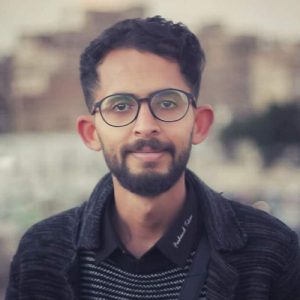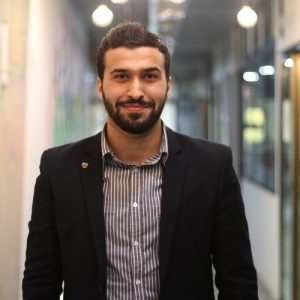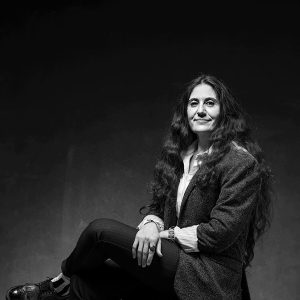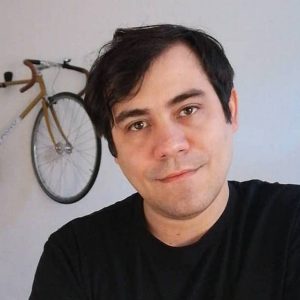Index relies entirely on the support of donors and readers to do its work.
Help us keep amplifying censored voices today.
 Yemeni artist Thiyazen Al-Alawi uses his craft to shed light on the destructive situation in Yemen through street art campaigns. He hopes to inform the public of what the war has done to his homeland.
Yemeni artist Thiyazen Al-Alawi uses his craft to shed light on the destructive situation in Yemen through street art campaigns. He hopes to inform the public of what the war has done to his homeland. Moe Moussa is a journalist, podcaster, poet, and the founder of the Gaza Poet Society. He uses various forums and mediums to amplify the voices of Palestinians.
Moe Moussa is a journalist, podcaster, poet, and the founder of the Gaza Poet Society. He uses various forums and mediums to amplify the voices of Palestinians. Fatoş İrwen is a Kurdish artist and teacher from Diyarbakır, Turkey working with a variety of materials and techniques.
Fatoş İrwen is a Kurdish artist and teacher from Diyarbakır, Turkey working with a variety of materials and techniques. Hamlet Lavastida has been described as a political activist by way of art. Lavastida uses his art to document human rights abuses in Cuba and to criticise Cuban authorities.
Hamlet Lavastida has been described as a political activist by way of art. Lavastida uses his art to document human rights abuses in Cuba and to criticise Cuban authorities.Index has filed a Council of Europe alert raising concerns about the decision to exclude certain journalists from accompanying UK Home Secretary Priti Patel on an official visit to Rwanda where she announced a proposed new arrangement for sending British migrants to the central African country to have their asylum claims decided.
Journalists from The Guardian, Financial Times and The Mirror were among those excluded by the Home Office on the mid-April press trip, restricting their ability to scrutinise a significant development in British foreign policy.
Among those excluded was Rajeev Syal, the Guardian’s home affairs editor, who had previously reported extensively on bullying allegations against Patel. Other home affairs specialists did accompany Patel on the trip. The Guardian said: “We are concerned that Home Office officials are deliberately excluding specific journalists from key briefings and engagements.”
The Financial Times told Press Gazette: “On this occasion our journalists were excluded from the press trip and received minimal briefing. It is clearly not good practice to exclude some media from government meetings simply because they are willing to ask difficult questions.”
Index understands it is not the first time journalists have been blacklisted by the Home Office in this way. Only a select group of reporters was invited on a trip Priti Patel made in November 2021 to Washington DC to discuss terrorism and the global migration crisis with Alejandro Mayorkas, US secretary of homeland security.
The government’s controversial scheme will see migrants who arrive in small boats after crossing the English Channel flown 4,000 miles to Rwanda to have their claims processed; in her speech in Rwanda, Patel said 28,000 migrants crossed the Channel this way in 2021.
Migrants will be encouraged to relocate to the African country. Patel said, “Those who are resettled will be given support, including up to five years of training to help with integration, accommodation, and healthcare, so that they can resettle and thrive.”
Opponents of the scheme have questioned Rwanda’s record on human rights and free expression. Journalists working in Rwanda operate under a strict accreditation system and criticism of President Paul Kagame is off limits.
In March, Human Rights Watch said Rwanda did not match up to international standards of free speech and warned of a wave of arrests of Rwandan journalists and commentators: “Judicial authorities in Rwanda, lacking the independence to stand up and protect free speech in accordance with international law, have unjustly convicted and jailed people based on their protected speech and opinions,” said Lewis Mudge, Central Africa director at Human Rights Watch.
The first legal challenge to the Rwanda scheme was launched last week on behalf of an Iranian asylum seeker. Lawyers argue the proposals breach international law, the UN refugee convention and British data protection legislation.
In her speech in Rwanda, Patel said, “This agreement fully complies with all international and national law, and as part of this ground-breaking agreement, the UK is making a substantial investment in the economic development of Rwanda.”
The Home Office has denied targeting certain journalists and says it adheres the UK’s Government Communication Service Propriety Guidance in dealing with the media.
The Council of Europe was founded after World War II to protect human rights, democracy and the rule of rule across the continent. It is committed to upholding the European Convention on Human Rights.
The British government will be asked to provide a formal response to the alert, although it has a poor record in this regard, responding to just 10 per cent of the alerts filed in 2021.
Jimmy Lai Chi-Ying, Hong Kong’s 74-year-old self-made billionaire, is a dissident. His cause is freedom. For championing this cause, he has been jailed since December 2020. One of the crimes he was found guilty of was lighting a candle in public to commemorate the 1989 Tiananmen Square massacre, when thousands were slaughtered. His real sin, however, was publishing Apple Daily, Hong Kong’s lone voice for freedom. This voice was smothered in June 2021 with the jailing of its senior journalists.
Lai could have remained free – he has homes in Paris, London, Kyoto and Taipei – but chose to stay in solidarity with the Hong Kong democrats being prosecuted. The UK abandoned Hong Kong in 1997 on China’s promise that its seven million-plus people would have “a high degree of autonomy” with “Hong Kong people ruling Hong Kong”.
However, the democrats’ demand for China to honour this pledge was rebuffed from the start and dealt a final blow in 2020 when Beijing imposed direct rule by promulgating a vague and sweeping National Security Law along with an electoral system modelled on Iran’s that allows only handpicked candidates. Virtually all democrat leaders have since been jailed.
Lai was born in Guangzhou. He escaped communist rule at the age of 12 by stealing his way into Hong Kong, hidden in the bottom of a small fishing boat. By the time he was in his 20s, he had risen from a child labourer to owning his own business.
He started Giordano, an international clothing retailer. Along the way he learned English – initially by reading the dictionary while living in the factory where he worked – and took to the brand of free-market economics espoused by Friedrich Hayek and Milton Friedman. He credited his success to the freedom he enjoyed in British Hong Kong. He vows to fight for this freedom so others may have the same opportunities.
Like most Hong Kong people, Lai’s political awakening came in the spring of 1989 when a democratic movement led by students erupted in Tiananmen Square in Beijing. He was sympathetic to their aspirations and lent them support by raising money through his Giordano stores.
After communist tanks mowed down demonstrators on 4 June 1989, he dedicated himself to upholding their torch of democracy by going into publishing in Hong Kong, where the press remained free.
He first launched Next, a weekly magazine, in 1990, and then Apple Daily on the eve of Hong Kong’s transition to Chinese rule. With their bold and fiercely independent editorial stance, both publications enjoyed wide readership and were successfully “cloned” in Taiwan. As the communists tightened their grip on Hong Kong, Lai was first forced to sell his controlling interest in Giordano and then his publications were subjected to orchestrated advertising boycotts. Though financial losses piled up, Lai did not waver. Readers’ loyalty remained to the end: when Apple Daily printed its last edition of one million copies on 24 June 2021, thousands of people waited in the middle of the night for it to roll off the press.
Lai is now represented by the London-based lawyer Caoilfhionn Gallagher QC. She has called Lai “a man of courage and integrity” and vowed to “pursue all available legal remedies to vindicate Mr. Lai’s rights”.
Lai’s wife Teresa is a devout Catholic. He himself converted to Catholicism when Hong Kong came under Chinese rule. China’s communists, often godless, are known to be ruthless, but in this couple they may have met their match. Because of his faith, Lai does not seek temporal salvation. He quoted the 15th-century German priest Thomas a Kempis in a letter to a friend from prison: “If thou willingly bear the Cross, it will bear thee, and will bring thee to the end which thou seekest, even where there shall be the end of suffering; though it shall not be here.”[/vc_column_text][vc_column_text]*****
Jimmy Lai has been in jail since December 2020. He has told friends and associates from his cell that he does not want to turn his “life into a lie” and willingly pays the price for upholding “truth, justice, and goodness”. He said he bears this price gladly and sees it as God’s grace in disguise. Here are excerpts from some of his prison letters.[/vc_column_text][vc_column_text]‘The muted anger of the Hong Kong people is not going away’
Apple Daily published its last edition of one million copies on 24 June 2021. This was how he reacted to it from prison. While deploring what he called “this barbaric suppression”, he was weighed down with guilt that his staff were incarcerated on his account and wished he could share “the pain of the cross” they bear. He vowed to find a spiritual way to help them.
The forced closure of Apple Daily Hong Kong showed clearly what [a] shipwreck life in Hong Kong has become for them. The damage done [by] the Hong Kong government and Beijing’s legitimacy long term is much greater [than] the temporary benefit of quieting down the voice of freedom of speech.
Yes, this barbaric suppression intimidation works. Hong Kong people are all quieted down. But the muted anger they have is not going away. Even those emigrating will have it forever. Many people are emigrating or planning to.
This Apple Daily shutdown only aggravates it, making it certain to people that the hopelessness of Hong Kong is irreversible. The more barbaric [the] treatment of Hong Kong people, [the] greater is their anger, and power of their potential resistance; [the] greater is the distrust of Beijing, of Hong Kong, [the] stricter is their rule to control.
The vicious circle of suppression-anger-and-distrust eventually will turn Hong Kong into a prison, a cage, like Xinjiang. World, cry for Hong Kong people.
Pastor Lee came to visit… Told me he had visited Cheung Kim Hung, our CEO, and Lo Wai Kong, our Chief Editor. They are both being remanded. Cheung, being a devout Christian, is doing fine. But Lo, who has no faith, is miserable.
What I can do to help him? Send him a Bible? But Bible is no faith, not panacea. Maybe I should ask Cardinal Zen to visit him to see what we can do for him.
It would be disingenuous to say that by creating Apple Daily I have put him in this situation. But I do have a guilty feeling and want to share his price of his cross, which is weighing too heavily on him. There must be something I can do to help. I will not cease until I find a way.
“If we suffer courageously, quietly, unselfishly, peacefully, the things [that] wreck our outer being perfect us within, and make us. And as [we] have seen, more truly ourselves.”
‘There is always a price to pay when you put truth, justice and goodness ahead of your own wellbeing’
Lai wrote in July 2021 to console his hotel staff in Canada for their suffering during the pandemic and held out the hope that soon he could share “the coming prosperity” with them. He also updated them on his life in prison, telling them not to worry about him, though when they “pass by a church, do go in and pray for me”.
Dear Bob,
If you are worry[ing] about me, please don’t. I am keeping myself busy reading the scriptures, gospels, theology and books of the saints and their lives… Life is peaceful and edifying… There is always a price to pay when you put truth, justice, and goodness ahead of your own comfort, safety and physical wellbeing, or your life becomes a lie. I choose truth instead of a lie and pay the price. Luckily God has made this price a grace in disguise. I am so grateful.
So, don’t worry about me. However, when you pass by a church, do go in [and] pray for me. Believers and non-believers, the sun shines on you the same. So the Lord will listen to you the same. Thank you! Hope to see you soon,
Cheers,
Jimmy.
‘I am changed… I can’t see myself going back to business again’
Lai wrote to a friend, James, in September 2021, saying that, by clinging to Christ, his life in prison “is full” and spiritually “at peace”. However, he was worried about his wife, Teresa, whom he said was weighed down by grief.
James,
I am doing fine, keeping myself busy, studying gospels, scriptures, theology and books on the saints and lives and prayers, touching the fringe of Christ’s cloak to live, so to speak. Life is full and at peace. I am learning and changed a lot. Can’t see myself going back to business again. All have to depend on others.
I do worry about my wife Teresa. She has lost a lot of weight under the grief of my situation. Lucky she has God [to] abide [with] her. May God bless you all.
Cheers,
Uncle Jimmy
‘But with her prayers, she will slug it through’
In October 2021, Lai wrote to a business associate about his happiness when his family visited him. He urged him to “keep writing”.
I am doing fine here. Happy to see Teresa, Claire, Tim and Ian and my brother… Teresa looks weak and weighed down by grief. But with her prayers, she will slug it through.
I am keeping myself busy here. Spiritual study, drawing and trying to improve my English writing skill. Take care!
So sweet of you to write me. Please keep writing. May God be with you all! Cheers, Uncle Jimmy
‘If thou willingly bear the Cross, it will bring thee [that] which thou seekest… ’
In a November 2021 letter to a friend, Lai copied the following quote from the 15th-century German priest Thomas a Kempis, author of The Imitation of Christ.
“If thou willingly bear the Cross, it will bear thee, and will bring thee to the end which thou seekest, even where there shall be the end of suffering; though it shall not be here.
“If thou bear it unwillingly, thou makest a burden for thyself and greatly increaseth thy load, and yet thou must bear it.”
‘Lord, remember those who shed their blood in Tiananmen Square’
Lai was sentenced 13 months in jail for attending the vigil in Victoria Park, Hong Kong, on 4 June 2020 that marked the 31st anniversary of the Tiananmen Square massacre. He protested his innocence by reading the following statement in court before he was sentenced. He appealed to God to grant the young men and women who died in Tiananmen their redemption.
I did not join the 4 June vigil in Victoria Park. I lit a candle light in front of reporters to remind the world to commemorate and remember those brave young men and women who 31 years ago in Tiananmen Square put the truth, justice and goodness above their lives and died for them.
If [to] commemorate those who died because of injustice is a crime, then inflict on me that crime and let me suffer the punishment of the crime, so that I may share the burden and glory of those men and women who shed their blood on June 4th to proclaim truth, injustice and goodness.
Lord, remember those who shed their blood, but do not remember their cruelty. Remember the fruits those young men and women have borne because what they did and grant, Lord, that the fruits these young men and women have borne may be their redemption. May the power of love of the meek prevail over the power of destruction of the strong.
This article and Lai’s letters appeared in the 50th anniversary issue of Index on Censorship magazine, alongside a picture that Lai drew of Jesus Christ on the cross. They were published on 15th March 2022. Click here for options on how to see and read the article in full.
The spring issue of Index magazine is special. We are celebrating 50 years of history and to such a milestone we’ve decided to look back at the thorny path that brought us here.
Editors from our five decades of life have accepted our invitation to think over their time at Index, while we’ve chosen pieces from important moments that truly tell our diverse and abundant trajectory.
Susan McKay has revisited an article about the contentious role of the BBC in Northern Ireland published in our first issue, and compares it to today’s reality.
Martin Bright does a brilliant job and reveals fascinating details on Index origin story, which you shouldn’t miss.
Index at 50, by Jemimah Steinfeld: How Index has lived up to Stephen Spender’s founding manifesto over five decades of the magazine.
The Index: Free expression around the world today: the inspiring voices, the people who have been imprisoned and the trends, legislation and technology which are causing concern.
“Special report: Index on Censorship at 50”][vc_column_text]Dissidents, spies and the lies that came in from the cold, by Martin Bright: The story of Index’s origins is caught up in the Cold War – and as exciting
Sound and fury at BBC ‘bias’, by Susan McKay: The way Northern Ireland is reported continues to divide, 50 years on.
How do you find 50 years of censorship, by Htein Lin: The distinguished artist from Myanmar paints a canvas exclusively for our anniversary.
Humpty Dumpty has maybe had the last word, by Sir Tom Stoppard: Identity politics has thrown up a new phenonemon, an intolerance between individuals.
The article that tore Turkey apart, by Kaya Genç: Elif Shafak and Ece Temulkuran reflect on an Index article that the nation.
Of course it’s not appropriate – it’s satire, by Natasha Joseph: The Dame Edna of South Africa on beating apartheid’s censors.
The staged suicided that haunts Brazil, by Guilherme Osinski: Vladimir Herzog was murdered in 1975. Years on his family await answers – and an apology.
Greece haunted by spectre of the past, by Tony Rigopoulos: Decades after the colonels, Greece’s media is under attack.
Ugandans still wait for life to turn sweet, by Issa Sikiti da Silva: Hopes were high after Idi Amin. Then came Museveni …People in Kampala talk about their
problems with the regime.
How much distance from Mao? By Rana Mitter: The Cultural Revolution ended; censorship did not.
Climate science is still being silenced, by Margaret Atwood: The acclaimed writer on the fiercest free speech battle of the day.
God’s gift to who? By Charlie Smith: A 2006 prediction that the internet would change China for the better has come to pass.
50 tech milestones of the past 50 years, by Mark Frary: Expert voices and a long-view of the innovations that changed the free speech landscape.
Censoring the net is not the answer, but… By Vint Cerf: One of the godfathers of the internet reflects on what went right and what went wrong.[/vc_column_text][vc_custom_heading text=”Five decades in review”][vc_column_text]An arresting start, by Michael Scammell: The first editor of Index recounts being detained in Moscow.
The clockwork show: Under the Greek colonels, being out of jail didn’t mean being free.
Two letters, by Kurt Vonnegut: His books were banned and burned.
Winning friends, making enemies, influencing people, by Philip Spender: Index found its stride in the 1980s. Governments took note.
The nurse and the poet, by Karel Kyncl: An English nurse and the first Czech ‘non-person’.
Tuning in to revolution, by Jane McIntosh: In revolutionary Latin America, radio set the rules.
‘Animal can’t dash me human rights’, by Fela Kuti: Why the king of Afrobeat scared Nigeria’s regime.
Why should music be censorable, by Yehudi Menuhin: The violinist laid down his own rules – about muzak.
The snake sheds its skin, by Judith Vidal-Hall: A post-USSR world order didn’t bring desired freedoms.
Close-up of death, by Slavenka Drakulic: We said ‘never again’ but didn’t live up to it in Bosnia. Instead we just filmed it.
Bosnia on my mind, by Salman Rushdie: Did the world look away because it was Muslims?
Laughing in Rwanda, by François Vinsot: After the genocide, laughter was the tonic.
The fatwa made publishers lose their nerve, by Jo Glanville: Long after the Rushdie aff air, Index’s editor felt the pinch.
Standing alone, by Anna Politkovskaya: Chechnya by the fearless journalist later murdered.
Fortress America, by Rubén Martínez: A report from the Mexican border in a post 9/11 USA.
Stripsearch, by Martin Rowson: The thing about the Human Rights Act …
Conspiracy of silence, by Al Weiwei: Saying the devastation of the Sichuan earthquake was partly manmade was not welcome.
To better days, by Rachael Jolley: The hope that kept the light burning during her editorship.
Plays, protests and the censor’s pencil, by Simon Callow: How Shakespeare fell foul of dictators and monarchs. Plus: Katherine E McClusky.
The enemies of those people, by Nina Khrushcheva: Khrushchev’s greatgranddaughter on growing up in the Soviet Union and her fears for the US press.
We’re not scared of these things, by Miriam Grace A Go: Trouble for Philippine
journalists.
Windows on the world, by Nazanin Zaghari-Ratcliffe and Golrokh Ebrahimi Iraee: Poems from Iran by two political prisoners.
Beijing’s fearless foe with God on his side, by Jimmy Lai: Letters from prison by the Hong Kong publisher and activist.
We should not be put up for sale, by Aishwarya Jagani: Two Muslim women in India on being ‘auctioned’ online.
Cartoon, by Ben Jennings: Liberty for who?
Amin’s awful story is much more than popcorn for the eyes, by Jemimah Steinfeld: Interview with the director of Flee, a film about an Afghan refugee’s flight and exile.
Women defy gunmen in fight for justice, by Témoris Grecko: Relatives of murdered Mexican journalist in brave campaign.
Chaos censorship, by John Sweeney: Putin’s war on truth, from the Ukraine frontline.
In defence of the unreasonable, by Ziyad Marar: The reasons behind the need
to be unreasonable.
We walk a very thin line when we report ‘us and them’, by Emily Couch: Reverting to stereotypes when reporting on non-Western countries merely aids dictators.
It’s time to put down the detached watchdog, by Fréderike Geerdink: Western newsrooms are failing to hold power to account.
A light in the dark, by Trevor Philips: Index’s Chair reflects on some of the magazine’s achievements.
Our work here is far from done, by Ruth Smeeth: Our CEO says Index will carry on fighting for the next 50 years.
In vodka veritas, by Nick Harkaway and Jemimah Steinfeld: The author talks about Anya’s Bible, his new story inspired by early Index and Moscow bars.
A ghost-written tale of love, by Ariel Dorfman and Jemimah Steinfeld: The novelist tells the editor of Index about his new short story, Mumtaz, which we publish.
‘Threats will not silence me’, by Bilal Ahmad Pandow and Madhosh Balhami: A Kashmiri poet talks about his 30 years of resistance.
A classic case of cancel culture, by Marc Nash: Remember Socrates’ downfall.